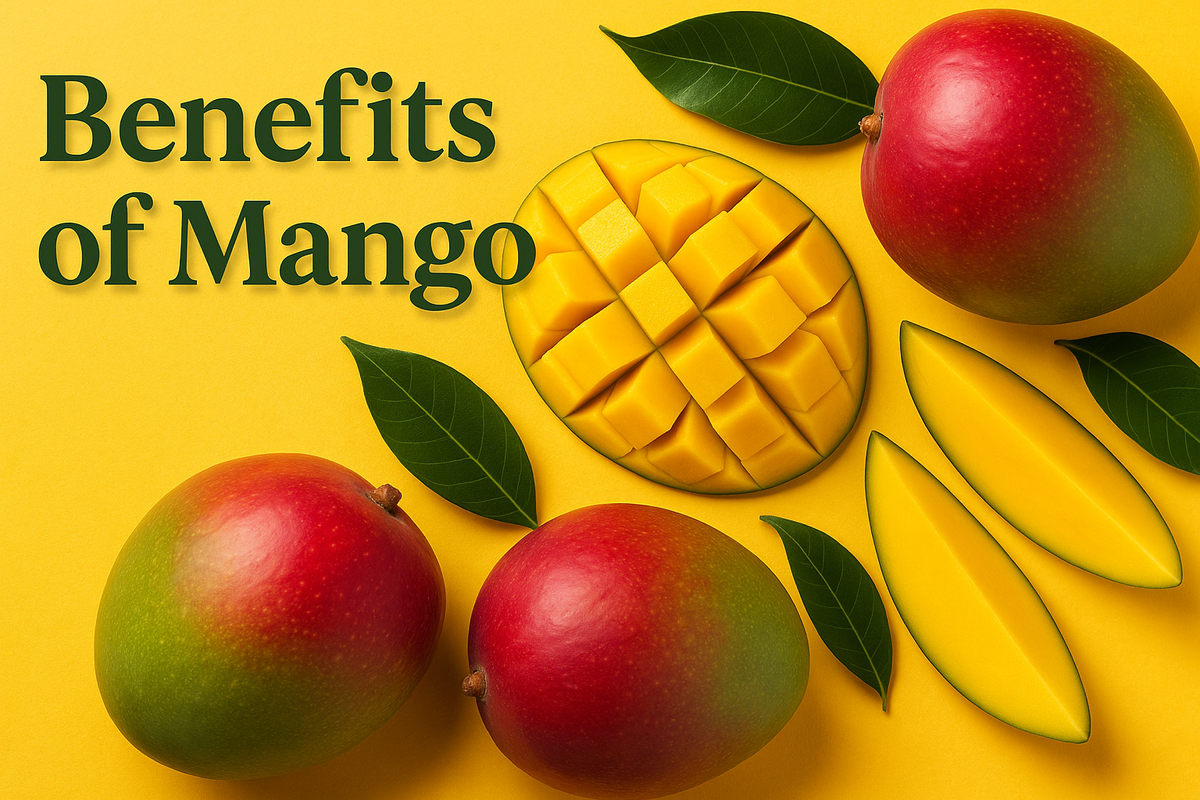Benefits of Mango 🥭 | Nature’s Delicious Superfruit

Known as the “King of Fruits,” mango isn’t just delicious—it’s also a powerhouse of nutrients and health benefits. Whether you enjoy it raw, in smoothies, chutneys, or desserts, mangoes offer more than just a tropical treat. In this article, we’ll explore the amazing benefits of mango and why it should be a regular part of your diet. 🌞
From boosting immunity to improving skin, digestion, and heart health, mango is nature’s sweet gift that keeps on giving. And while we’re talking health, don’t miss these powerful reads on the Benefits of Green Tea and Benefits of Coconut Water. 🧃
1. Rich in Nutrients 🍃
Mangoes are packed with essential nutrients. A single cup (about 165 grams) of sliced mango contains:
- Vitamin C – 67% of the Daily Value (DV)
- Vitamin A – 10% of the DV
- Folate – 18% of the DV
- Vitamin E, K, and several B vitamins
- Small amounts of magnesium, potassium, calcium, iron, and zinc
That’s a lot of nutrition packed into one sweet, juicy bite! 🥭
2. Boosts Immunity 🛡️
Vitamin C is known for supporting the immune system, and mangoes are an excellent source. One mango provides over two-thirds of your daily requirement. It helps your body fight infections, heal wounds, and absorb iron efficiently.
Additionally, the vitamin A in mangoes helps maintain a healthy immune response and keeps mucous membranes in the eyes and respiratory tract strong against germs. 💪
3. Supports Eye Health 👀
Mangoes are rich in lutein and zeaxanthin—antioxidants that protect the retina from harmful light. They also contain vitamin A, which prevents dry eyes and night blindness.
If you’re looking to keep your eyes healthy as you age, mangoes can be your fruity friend. 😊
4. Aids Digestion and Gut Health 💩
Mangoes contain enzymes like amylases, which help break down carbs into simple sugars, making them easier to digest. The fiber content also keeps bowel movements regular and reduces constipation.
Regular mango consumption has been linked with improved gut health and smoother digestion—just another reason to love this juicy fruit. 🧡
5. Great for Skin and Hair 🌟
Thanks to its rich vitamin C content, mango promotes collagen formation, which helps keep your skin firm and youthful. Vitamin A also supports healthy skin cell production and helps reduce acne breakouts.
Want glowing skin and shiny hair? Mango is nature’s beauty food! 💁♀️
6. A Natural Energy Booster ⚡
Mangoes contain natural sugars like fructose and glucose, which give you a quick burst of energy. This makes mango an ideal pre-workout snack or an afternoon pick-me-up during summer months.
Pair it with a protein-rich food for a balanced mini-meal. 🏋️
7. Supports Heart Health ❤️
Potassium and magnesium found in mangoes help regulate blood pressure and maintain a healthy heart rhythm. Antioxidants such as mangiferin may help protect the heart and reduce inflammation.
For a healthy heart, mango is a sweet step in the right direction. 💓
8. Helps Manage Weight 🧘♂️
While mangoes are sweet, they are relatively low in calories and high in fiber, which helps keep you feeling full. Replacing processed snacks with mangoes can help reduce overall calorie intake.
They’re a better alternative to sugary snacks, sodas, or artificial desserts. 🍰❌
9. Antioxidant Powerhouse 🧬
Mangoes contain several antioxidants, including beta-carotene, flavonoids, and polyphenols like mangiferin. These compounds help combat oxidative stress, reduce inflammation, and protect your body from chronic diseases.
It’s like giving your body internal armor. 🛡️
10. May Help Prevent Certain Cancers 🧪
Preliminary studies suggest that mangiferin and other compounds in mango may have anti-cancer properties. These antioxidants may help inhibit the growth of certain types of cancer cells, including those of the breast and colon.
While more research is needed, mangoes are a delicious way to add more cancer-fighting compounds to your diet. 🍽️
11. Supports Brain Health 🧠
Mangoes contain B vitamins, especially B6, which is crucial for brain development and function. The antioxidants and vitamins in mango also support neurotransmitter function and may help enhance memory and mood.
Need a brain boost? Blend up a mango smoothie before your next brainstorming session! 🧋
12. Delicious and Versatile in Recipes 🍴
Aside from the health benefits, let’s not forget that mangoes are incredibly versatile:
- 🥭 Add to smoothies, juices, and lassis
- 🥗 Mix into salads for a tropical twist
- 🍚 Make mango rice or sticky mango desserts
- 🌶️ Prepare spicy mango chutneys or pickles
There’s a mango recipe out there for every taste bud!
Bonus Tip 🌿 Pair Mango with Other Superfoods
Want to take your health up a notch? Combine mango with other superfoods like:
- Green Tea – rich in antioxidants and helps with fat burning
- Coconut Water – excellent hydration and electrolyte balance
- Chia seeds, flaxseeds, and Greek yogurt for smoothies
Mix them up and feel the difference! 🌈
Precautions When Eating Mango ⚠️
While mango is healthy, moderation is key:
- People with diabetes should monitor portions due to natural sugar content.
- Some may be allergic to mango skin (similar to poison ivy).
- Always wash mangoes thoroughly to remove pesticide residues.
Other than that, mango is generally safe and incredibly good for you!
Final Thoughts 🥭
Mangoes are more than just a delicious summer fruit—they're a superfood loaded with benefits for your body, skin, heart, and mind. From supporting digestion to improving immunity, mango deserves a place on your plate year-round.
Pair it with the benefits of green tea or rehydrate with the benefits of coconut water for a truly balanced and healthy lifestyle. 🌿
So the next time you're at the market, don’t hesitate—grab that golden mango and enjoy every bite guilt-free! 🥭✨





